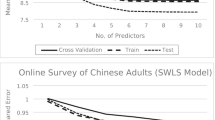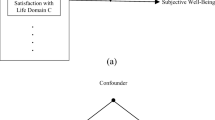Abstract
The purpose of this article is to examine the recent claims calling for abolishing domain importance weighting in quality of life (QoL) measures by considering the evidence conceptually and empirically. Based on a close review of evidence presented to date, it is suggested that using the range-of-affect hypothesis as a possible explanation of the poor performance of weighted satisfaction composite in predicting or correlating with global satisfaction or QoL measures can be beneficial to our understanding of the life satisfaction literature. However, given the conceptual focus and the empirical approach of the range-of-affect hypothesis presented in the life satisfaction context, using the range-of-affect hypothesis to argue against domain importance weighting raised more questions than answers. Calling for abolishing domain importance weighting in QoL measures, based on the evidence of range-of-affect hypothesis, is premature.
Similar content being viewed by others
References
Campbell, A., Converse, P. E., & Rogers, W. L. (1976). The quality of American life: Perceptions, evaluations, and satisfactions. New York: Russel Sage.
Diener, E., Emmons, R. A., Larsen, R. J., & Griffin, S. (1985). The satisfaction with life scale. Journal of Personality Assessment, 49, 71–74.
Evans, M. G. (1991). The problem of analyzing multiplicative composites: Interactions revisited. American Psychologist, 46, 6–15.
Ferrans, C. E. (1990). Development of a quality of life index for patients with cancer. Oncology Nursing Forum, 17(3), 15–19.
Ferrans, C. E., & Powers, M. J. (1985). Quality of life index: Development and psychometric properties. Advances in Nursing Science, 8(1), 15–24.
Hsieh, C. M. (2003). Counting importance: The case of life satisfaction and relative domain importance. Social Indicators Research, 61, 227–240.
Hsieh, C. M. (2004). To weight or not to weight: The role of domain importance in quality of life measurement. Social Indicators Research, 68, 163–174.
Inglehart, R. (1978). Value priorities, life satisfaction, and political dissatisfaction among western publics. Comparative Studies in Sociology, 1, 173–202.
Locke, E. A. (1969). What is job satisfaction? Organizational Behavior and Human Performance, 4, 309–336.
Locke, E. A. (1976). The nature and causes of job satisfaction. In M. D. Dunnette (Ed.), Handbook of industrial and organizational psychology (pp. 1297–1349). Chicago: Rand McNally.
Locke, E. A. (1984). Job satisfaction. In M. Gruneberg & T. Wall (Eds.), Social psychology and organizational behavior (pp. 93–117). London: Wiley.
Marsh, H. W. (1986). Global self-esteem: Its relation to specific facets of self-concept and their importance. Journal of Personality and Social Psychology, 51, 1224–1236.
Mastekaasa, A. (1984). Multiplicative and additive models of job and life satisfaction. Social Indicators Research, 14, 141–163.
McFarlin, D. B., Coster, E. A., Rice, R. W., & Coopper-Alison, T. (1995). Facet importance and job satisfaction: Another look at the range of affect hypothesis. Basic and Applied Social Psychology, 16, 489–502.
McFarlin, D. B., & Rice, R. W. (1992). The role of facet importance as a moderator in job satisfaction processes. Journal of Organizational Behavior, 13, 41–54.
Rice, R. W., Gentile, D. A., & McFarlin, D. B. (1991a). Facet importance and job satisfaction. Journal of Applied Psychology, 76, 31–39.
Rice, R. W., Markus, K., Moyer, R. P., & McFarlin, D. B. (1991b). Facet importance and job satisfaction: Two experimental tests of Locke’s range of affect hypothesis. Journal of Applied Social Psychology, 21, 1977–1987.
Rojas, M. (2006). Life satisfaction and satisfaction in domains of life: Is it a simple relationship? Journal of Happiness Studies, 7, 467–497.
Russell, L. B., & Hubley, A. M. (2005). Importance ratings and weighting: Old concerns and new perspectives. International Journal of Testing, 5, 105–130.
Russell, L. B., Hubley, A. M., Palepu, A., & Zumbo, B. D. (2006). Does weighting capture what’s important? Revisiting subjective importance weighting with a quality of life measure. Social Indicators Research, 75, 146–167.
Ryff, C. D., & Essex, M. J. (1992). The interpretation of life experience and well-being: The sample case of relocation. Psychology and Aging, 7, 507–517.
Skalli, A., Theodossioub, I., & Vasileioua, E. (2008). Jobs as Lancaster goods: Facets of job satisfaction and overall job satisfaction. Journal of Socio-Economics, 37, 1906–1920.
Smith, R., & Deppa, B. (2009). Two dimensions of attribute importance. Journal of Consumer Marketing, 26, 28–38.
Trauer, T., & Mackinnon, A. (2001). Why are we weighting? The role of importance ratings in quality of life measurement. Quality of Life Research, 10, 579–585.
Wu, C. H. (2008a). Examining the appropriateness of importance weighting on satisfaction score from range-of-affect hypothesis: Hierarchical linear modeling for within-subject data. Social Indicators Research, 86, 101–111.
Wu, C. H. (2008b). Can we weight satisfaction score with importance ranks across life domains? Social Indicators Research, 86, 468–480.
Wu, C. H., & Yao, G. (2006a). Do we need to weight item satisfaction by item importance? A perspective from Locke’s range-of-affect hypothesis. Social Indicators Research, 79, 485–502.
Wu, C. H., & Yao, G. (2006b). Do we need to weight satisfaction scores with importance ratings in measuring quality of life? Social Indicators Research, 78, 305–326.
Wu, C. H., & Yao, G. (2007). Importance has been considered in satisfaction evaluation: An experimental examination of Locke’s range-of-affect hypothesis. Social Indicators Research, 81, 521–541.
Author information
Authors and Affiliations
Corresponding author
Rights and permissions
About this article
Cite this article
Hsieh, Cm. Should We Give Up Domain Importance Weighting in QoL Measures?. Soc Indic Res 108, 99–109 (2012). https://doi.org/10.1007/s11205-011-9868-8
Accepted:
Published:
Issue Date:
DOI: https://doi.org/10.1007/s11205-011-9868-8




